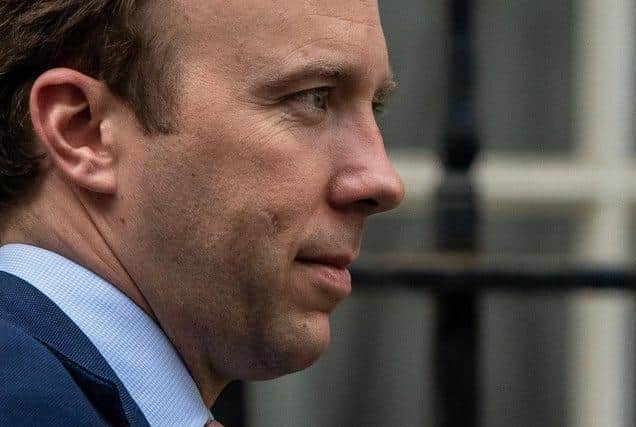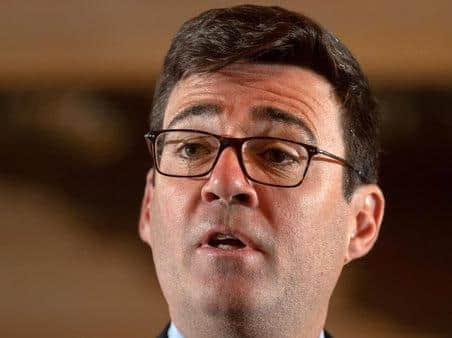Health Secretary confirms new payment for people self-isolating in highest risk areas
and live on Freeview channel 276
People on low incomes who need to self-isolate and are unable to work from home in areas with high incidence of COVID-19 will benefit from a new payment scheme starting on Tuesday 1 September, the Health Secretary has announced today.
Starting with a trial in Blackburn with Darwen, Pendle and Oldham to ensure the process works, eligible individuals who test positive with the virus will receive £130 for their 10-day period of self-isolation. Other members of their household, who have to self-isolate for 14 days, will be entitled to a payment of £182.
Advertisement
Hide AdAdvertisement
Hide AdNon-household contacts advised to self-isolate through NHS Test and Trace will also be entitled to a payment of up to £182, tailored to the individual length of their isolation period.


It is designed to support people who are unable to work from home while self-isolating, either after testing positive, or after being identified by NHS Test and Trace as living in the same household as – or coming into contact with – someone who has tested positive. It will be available to people currently receiving either Universal Credit or Working Tax Credit.
Health Secretary Matt Hancock said:
“The British public have already sacrificed a great deal to help slow the spread of the virus. Self-isolating if you have tested positive for COVID-19, or have come into contact with someone who has, remains vital to keeping on top of local outbreaks.
“This new payment scheme will help people on low incomes and who are unable to work from home to continue playing their part in the national fight against this virus.”


Advertisement
Hide AdAdvertisement
Hide AdPayments will be provided within 48 hours of the eligible individual providing the necessary evidence. Individuals will be asked to provide a notification from NHS Test and Trace and a bank statement.
The local authority can also check the NHS Test and Trace system to confirm the individual has been asked to self-isolate, if the individual is unable to provide this information. The local authority will put in place checks to prevent fraud and ensure compliance through welfare check-ins, phone calls and employment checks.
There will be a rapid review of the scheme in Blackburn with Darwen, Pendle and Oldham to assess the performance consider how effectively vulnerable people have been reached, and consider how far it has helped reduce transmission of the virus in these areas. If the approach is successful, the scheme will be quickly applied in other areas of high COVID-19 incidence.
This will not reduce any other benefits that they receive. This payment equates to:
Advertisement
Hide AdAdvertisement
Hide Ad- £130 if an individual has tested positive for coronavirus and has to self-isolate for 10 days (from the point they first developed symptoms).
- £182 if a member of an individual’s household has tested positive for coronavirus and they are asked to self-isolate for 14 days (from the point the member of their household first developed symptoms).
- £13 per day (up to a maximum of £182) if an individual is identified as a non-household contact of another person who has tested positive for coronavirus and is asked to self-isolate up until 14 days after they were most recently in contact with the person who tested positive.
To be eligible for the funding, individuals must meet the following criteria:
Advertisement
Hide AdAdvertisement
Hide Ad- have tested positive for Covid-19 or received a notification from NHS Test and Trace asking them to self-isolate.
- have agreed to comply with the notification from NHS Test and Trace and provided contact details to the local authority.
- be employed or self-employed. Employed people will be asked to show proof of employment. Self-employed will be required to show evidence of trading income and that their business delivers services which the local authority reasonably judges they are unable to carry out without social contact.
- be unable to work from home (checks will be undertaken on all applicants) and will lose income a result.
Advertisement
Hide AdAdvertisement
Hide Ad- be currently receiving Universal Credit or Working Tax Credit.
The Mayor of Greater Manchester, Andy Burnham, has repeatedly called for the introduction of such a scheme, but said the Government's announcement "goes nowhere near far enough."
He said: “I have been calling for weeks for the Government to provide financial support for those asked to self-isolate. I am pleased they have at last acknowledged this issue but am sorry to say this move goes nowhere near far enough.
“The Health Secretary has already said that he couldn’t live on Statutory Sick Pay (SSP) at £95 a week. So how can an announcement like this work?
Advertisement
Hide AdAdvertisement
Hide Ad“For many workers in Greater Manchester, this will not provide the support people need to cooperate with NHS Test and Trace. Having belatedly acknowledged that something needs to be done, Government must now accept the calls of the ‘Time Out to Help Out’ campaign and support people across the country to self-isolate on full pay.
“For us to get a grip on this virus before we head into a winter without a vaccine, the vast majority of those contacted by national Test and Trace need to be able to self-isolate immediately and not worry about loss of earnings or, worse, losing a job. Quite simply, these measures are not good enough.”